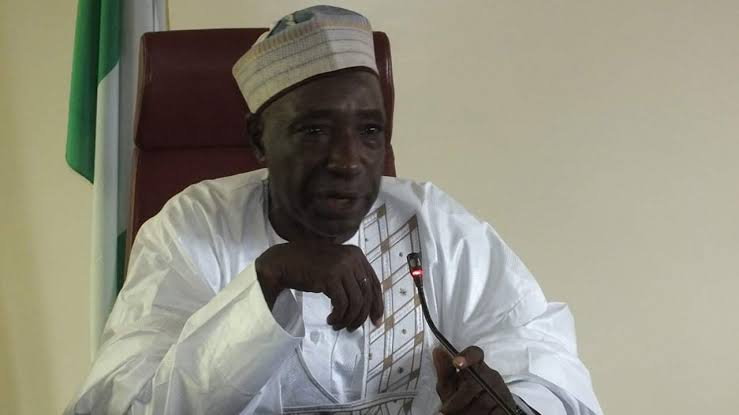How agric ministry struggled to stay relevant in 2019
…as key FG programmes taken over by other agencies The Federal Ministry of Agriculture and Rural Development struggled through2019 without any meaningful programme that impacted the lives of smallholder farmers. This is more so because key successful agricultural programmes of the Buhari administration were driven by agencies or institutions outside the control of the ministry. […]

Minister of Agriculture and Rural Development, Sabo Nanono
…as key FG programmes taken over by other agencies
The Federal Ministry of Agriculture and Rural Development struggled through2019 without any meaningful programme that impacted the lives of smallholder farmers.
This is more so because key successful agricultural programmes of the Buhari administration were driven by agencies or institutions outside the control of the ministry.
Observers said it was difficult to pinpoint any key programme implemented by the ministry since the inauguration of the new ministers, Alhaji Sabo Nanono and Mustapha Baba Shehuri on August 21, 2019.
They, however, attributed the inability of the two ministers to embark on any serious project to paucity of funds in view of the fact that most presidential initiatives are domiciled elsewhere, rendering the ministry ineffective.
The Anchor Borrowers’ Programme
The Anchor Borrowers’ Programme, which was launched on November 17, 2015, in Birnin-Kebbi, Kebbi State to drive self-sufficiency in major crops like rice and wheat, is the initiative of the Central Bank of Nigeria, which has huge financial muscle.
The ABP soon became the most successful agricultural story of the current administration, which completely blacked out the main ministry.
Former minister Chief Audu Ogbeh had at different fora complained of paucity of funds for the main ministry to execute key programmes as the CBN under Godwin Emefiele had taken all the shine.
Also, at the 2019 National Agricultural Show held at the outskirts of Abuja in October, the Chairman Senate Committee on Agriculture, Senator Abdullahi Adamu, expressed his foundation’s feelings about where the ABP should be based.
“Let me make an objective intervention on the administration of the Anchor Borrower’sProgramme(ABP). Our National Agricultural Foundation accepts as laudable the principle behind the scheme, but we honestly do not believe that the Central Bank of Nigeria is properly placed to administer it.
“Part of the reasons that the scheme cannot be said to be completely successful is because it is not been operated by the appropriate government agency,” the senator said.
The Presidential Fertiliser Initiative
Another success story of Buhari’s administration was the ability of the government to address the hurdles around fertiliser supply.
In February 2017, Buhari flagged off the Presidential Fertiliser Initiative (PFI) which was approved in December 2016.
It started when the King of Morocco, Mohammed VI, paid a 2-day state visit to Nigeria in December 2016 leading to signing of different bilateral agreements for the supply of phosphate- a key ingredient for NPK fertilizer by OCP, a Moroccan state-owned company – to blending plants under the aegis of Fertiliser Producers and Suppliers of Nigeria (FEPSAN).
The goal was to make available one million metric tons of blended Nitrogen, Phosphorous and Potassium (NPK) fertilisers to farmers across the country for the wet season and 500,000 metric tons for dry season farming at the landing market price of N5,500.
Again, that programme is domicile outside the Federal Ministry of Agriculture and Rural Development.
It is championed by Jigawa State Governor Mohammed Badaru Abubakar and Thoma Etuh, President of Fertiliser Producers and Suppliers Association of Nigeria (FEPSAN), and the chairman of Unity Bank.
The Federal Ministry of Agriculture and Rural Development has no stake in that programme as the key drivers are not from the ministry.
National Livestock Transformation Programme (NLTP)
Another programme that is implemented outside the ministry is the National Livestock Transformation Programme (NLTP) by the National Economic Council headed by the Vice President, Professor Yemi Osinbajo.
(NLTP) is a programme of the federal government designed to run from 2019-2028 in partnership with state governments to be executed by the National Economic Council.
An initial N92 billion will be targeted at providing grants for the development of the country’s livestock sector by setting up ranches and developing grazing reserves and to be implemented in seven pilot states of, Plateau, Nasarawa, Taraba, Zamfara Adamawa, Benue and Kaduna.
Sources said the federal ministry was involved at the initial stage but was later taken over by the presidency blacking out the agric ministry even though they have been listed as implementing partners. However, findings revealed the ministry was actually at the back seat of the implementation.
Bt. cotton, cowpea
The recent release and commercialisation of Bt. cotton and cowpea has, however, been the success story of the agencies under the Federal Ministry of Science and Technology.
Again here, the Federal Ministry of Agriculture and Rural Development has no share of the glory.
